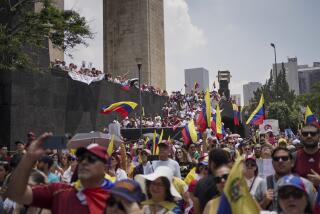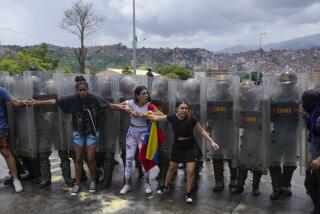Challenger claims win over Mugabe
- Share via
HARARE, ZIMBABWE — Zimbabwe opposition leader Morgan Tsvangirai claimed Tuesday to have defeated President Robert Mugabe in Saturday’s presidential election and called on the longtime leader to respect voters’ will.
In his first public appearance since the vote, Tsvangirai endorsed official results released thus far and said any talks on a smooth transition could occur only after the Zimbabwe Electoral Commission’s final announcement of the tally.
The latest figures released by the commission showed Mugabe’s ruling party winning 86 parliament seats and Tsvangirai’s opposition party winning 85, with five others going to a third party. The outcome of the remaining 34 seats in the 210-seat parliament had yet to be announced.
No official results had yet been posted in the presidential voting, and Tsvangirai said his victory claim was based on a full tally of the results from each polling station by his opposition Movement for Democratic Change. He promised to release the specific tabulations today, ratcheting up pressure on Mugabe, who did not speak publicly Tuesday, to abide by the electoral process.
As the tectonic plates appear to shift in Zimbabwe, the autocratic Mugabe, after 28 years in power, finally looks vulnerable.
Tsvangirai rejected reports of talks on a deal for Mugabe’s departure. However, his party is known to be in contact with some military and security figures in a bid to erode Mugabe’s support and to win their backing for a transition of power.
“Let’s not be influenced by speculation. There are no discussions,” Tsvangirai said.
Rumors flying around Harare -- most involving Mugabe’s departure, dignified or otherwise -- have chipped away at the president’s aura of invincibility.
‘Cockerel is in the pot’
Phone text messages were zipping around, some containing tallies of the number of votes Mugabe may have lost by, others gleefully joking that “the Cockerel is in the pot,” just waiting to be eaten.
Many Zimbabweans call Mugabe “the Old Man.” Others refer to him as Jongwe, which means “the Cockerel” in Shona, derived from the symbol of his ruling ZANU-PF party. Many young professionals in Harare, the capital, refer to him simply as “the Dictator.”
ZANU-PF party figures Tuesday privately acknowledged that the best-case scenario in the presidential election was a runoff if neither major party candidate received more than 50% of the vote.
One Mugabe ally, who asked to remain anonymous, said the chances of the incumbent winning were “slim.” Analysts believe Mugabe would face almost certain defeat in a second round because Tsvangirai would probably receive much of the vote that went to the third-place finisher in Saturday’s election.
One senior provincial ZANU-PF figure said the fact that election results were posted publicly at polling stations meant there was no possibility of rigging the vote.
Even if, against all odds, Mugabe defies voters’ will and clings to power with the aid of a coterie of military and security chiefs, many believe that Zimbabwe’s economy and raging hyperinflation would nonetheless lead to his being toppled within a few months.
No one who follows Zimbabwean politics is willing to write off Mugabe just yet, because he has outmaneuvered opponents so many times.
But a combination of poverty, hunger and hyperinflation that have made Zimbabweans’ lives intolerable could result in Mugabe’s perfect storm. At this point, there appear to be no state resources available for him to buy his way out of the crisis -- some even doubt the state’s fiscal capacity to undertake an election runoff -- independent economists predict inflation could reach 500,000% by May, and signs are evident of deep, mutinous discontent in the police and military.
Men in uniform are a common sight on the streets of Zimbabwe, but the uniforms are often threadbare and the soldiers and police hitchhike to get around. Any rank-and-file soldiers say commanders often send their men home because there is no food in the barracks to feed them.
Even the senior command is believed to be divided, and the unhappiness of rank-and-file security forces has prompted questions on how loyal the military would be to Mugabe in the event of a major security crisis such as widespread violent protests. Mugabe once famously boasted of having a “degree in violence”: Of the many strands of Mugabe’s power that have started to unwind, perhaps the most important is violence.
The elections and campaign were relatively free of violence compared with previous votes, so people appear less afraid. Opposition activists campaigned in rural areas where five years ago they would have feared being killed or beaten or their houses being burned down. Subsistence farmers who election after election voted for Mugabe and the ruling party deserted ZANU-PF in droves as the intimidation receded.
When MDC activist Edson Sibanda, 33, started door-knocking in his village of Chimanikire in January, he was expecting beatings or, at the very least, threats.
The village about 100 miles north of Harare is a typical rural ruling party stronghold whose population consists of dirt-poor subsistence farmers and equally poor veterans of the 1970s liberation war who invaded white farms in 2000 in support of Mugabe’s land redistribution program.
‘People have changed’
“There was no negative response. People appreciated what I was saying, because I was telling them the truth, about the economy, the health sector, education,” Sibanda said. “People have changed. Before, we could never have expected the MDC to win in that area.”
MDC strategist Ian Makone said it was clear the atmosphere of fear had lifted when women started appearing at opposition political rallies.
“I think the tipping point was the suffering. People just can’t make ends meet. Mugabe wanted to blame all that suffering on Morgan [Tsvangirai], but it didn’t hold sway.”
One senior ZANU-PF figure said Mugabe’s chances of winning back votes from Tsvangirai in a runoff would be slim because the only thing voters want is food in the shops.
But he also sounded an ominous note: The stakes are so high and the atmosphere so tense that a second-round contest could see violence.
“It may not be peaceful,” he said. “I’m seeing a change if there’s a second round.”
--
More to Read
Sign up for Essential California
The most important California stories and recommendations in your inbox every morning.
You may occasionally receive promotional content from the Los Angeles Times.













